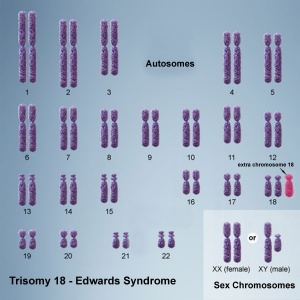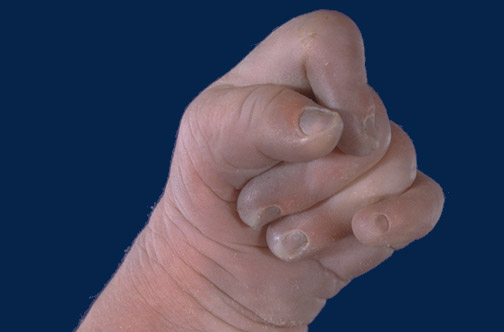Trisomy 18
Edwards Syndrome
I was doing some research on what happens when a person has an extra 18th chromosome, and i saw that it was a disorder called Edwards Syndrome ( See figure 1), named after John
Hilton Edwards, who first described the syndrome in 1960.

-Figure one
I did some more research and found many more websites that I
used as resources and that are listed on the bottom, but the one I found that
had the most information was this one
It is the second most
common autosomal trisomy, after Down syndrome
Edwards syndrome is a condition which is caused by an error in
cell division, known as meiotic disjunction. The syndrome occurs in about
every 1 out of every 6000 births.
Unlike Down syndrome, which is also caused by a chromosomal
defect, the developmental issues caused by trisomy 18 are associated with
medical complications that are more potentially life threating in the early
years of a child’s life. 80% of the affected babies are female, and a majority
of fetuses with it die before birth. It has a very low rate of survival since
the syndrome’s symptoms are heart abnormalities, kidney malformations and other
internal organ disorders.
There are three types of Trisomy 18:
1. Full
Trisomy 18 – The most common type that occurs in 95% of cases. With full
Trisomy, the extra chromosome occurs in every cell in the baby’s body. This
type is not hereditary, which means that it cannot be inherited from the baby’s
biological parents. It cannot be caused by anything the parents did before or
during pregnancy.
2. Partial
Trisomy 18 – This type is very rare. It occurs when only part of an extra
chromosome Is present. Some partial trisomy 18 syndromes may be caused by hereditary
factors. Very rarely, a piece of chromosome 18 becomes attached to another
chromosome before or after conception.
3. Mosaic
Trisomy 18 – Mosaic trisomy is also very rare. It occurs when the extra
chromosome some of the cells in the body. Like full Trisomy 18, Mosaic Trisomy
is also not inherited and it is a random occurrence which takes place during
cell division
This is a very deadly syndrome, since only
5-10% of babies with it live past their first year. And if they do, they have
overlapping fingers, a small and abnormally shaped head, a small jaw and mouth,
and they have severe intellectual disability as well ( See Figures 2 and 3). The babies also have many
more characteristics, such as:
·
Heart defects
·
Kidney problems
·
Part of the intestinal tract is outside the
stomach
·
The esophagus doesn’t connect to the stomach
·
Excess amniotic fluid
·
Pocket of fluid on the brain
·
Rocker bottom feet
·
Delayed growth
·
Low set ears
·
Umbilical or inguinal hernia

-Figure two

-Figure three
However, in the light of the information that most babies don't survive birth, or even their first year, there is a man that turned 21 last year in september. His name is Donnie Heaton, and he has Trisomy 18. He is the oldest known patient with the syndrome, and he has had massive disabilities his entire life. He weighs only 55 pounds, which is approximately 25 kilograms. He goes to a special needs school, and although he doesn't walk or talk, he expresses emotions and loves to ride the bus with his friends. His mother, Karen, did not have an Amniocentesis since she didn't believe in having an abortion, and she was expecting Donnie to be a normal kid. She had this to say about him :
However, in the light of the information that most babies don't survive birth, or even their first year, there is a man that turned 21 last year in september. His name is Donnie Heaton, and he has Trisomy 18. He is the oldest known patient with the syndrome, and he has had massive disabilities his entire life. He weighs only 55 pounds, which is approximately 25 kilograms. He goes to a special needs school, and although he doesn't walk or talk, he expresses emotions and loves to ride the bus with his friends. His mother, Karen, did not have an Amniocentesis since she didn't believe in having an abortion, and she was expecting Donnie to be a normal kid. She had this to say about him :
“I was 42 when I became pregnant with Donnie. I didn’t have amniocentesis, because I don’t believe in abortion and I didn’t think there would be anything wrong. I thought he’d be a healthy bouncing baby boy, until he was born.
They called him a vegetable at birth. Donnie’s godmother is an RN and she was in the delivery room. She knew there was something wrong. The first doctor to see him knew what was wrong. He said, ‘take him home and love him and he’ll die in your arms.’ They said he’d be blind and hearing impaired, and he’s not. And he has full blown trisomy 18, he’s not a mosaic.
Donnie’s low functioning. He’s had pneumonia three times this year. He lived through a C. difficile infection. He has fevers, heart and bowel problems, and urinary tract infections, and he breaks his fragile bones. He doesn’t walk or talk. He weighs 55 pounds, and he won’t get any bigger. But he keeps on going.
He’s definitely not a vegetable. He’s a little person. He reacts appropriately. I use a suction machine and when I put the part near him, he opens his mouth. He knows. He recognizes people. His face lights up when he sees people he knows. I can’t quite comprehend that he’s that rare, but according to the geneticist, Donnie is believed to be the oldest person in the world with trisomy 18.
He loves his special needs school, and I’m heartsick because he’s aging out of everything. He loves music, and being on the school bus with other kids. I’ll have to stop calling him a kid!
He vocalizes. I know when he’s wet his diaper. He makes happy noises. We like watching game shows on TV. He likes the different colored lights, the sound of the clapping. He picks up on the excitement. He lies in a big lazy boy chair, and I sit on the couch right beside him. We like Wheel of Fortune, The Price Is Right, and Let’s Make a Deal.
There’s a light inside those eyes, I can see it. Donnie amazes me.”
Donnie isn't and never was a vegetable, but he's different. Trisomy 18 is the second most appearing syndrome in all cases and not enough people know about it. It's rarely in the news and nobody is even caring about the mothers and fathers that go through a tough time with their children, before and after birth.
Other websites to check out if you want to learn more, and the ones i used for research
- http://www.ncbi.nlm.nih.gov/gtr/conditions/C0152096/
- http://ghr.nlm.nih.gov/condition/trisomy-18
- http://blogs.plos.org/dnascience/2013/09/05/a-very-special-birthday-for-a-young-man-with-trisomy-18/
Good job Zoran! I really like how you organized your blog post. I was very detailed and provided lots of valuable information. Apart from your organization which was amazing, I also enjoyed you pictures and found it really helpful when you put in the long detailed quote. It is really sad how only some babies get to survive. Great job!
ReplyDeleteGreat Job Zoran! I really enjoyed reading your blog and I like how you structured your information. Also I like how you discussed the story and then the disorder as well. Overall I though that you did a really good job.
ReplyDeleteNice job Zoran! The organization of your blog was quite nice. The detailed information found within your article is quite well stated making your point more clear. The pictures helped push forward your writing and the quoting was well down as well. You did well Zoran nice going.
ReplyDeleteZoran I think that your blog post is really good! I really liked all of the information, and it was very clearly stated, for me it was very interesting to learn about the syndrome you wrote about (trisomy 18). I also think that your organization is really good. A thing that you could to better is to make a caption for the images you put in other then that its was amazing.
ReplyDeleteYour blog post is really good! There is so much information given to us, which comes with the background information about the disease and the news article. I have to admit I liked the pictures, and the fact you gave us a warning. Maybe you could have changed your font in the end of the blog, but everything else looks awesome! Good job! :)
ReplyDeleteI really liked your blog post because you included a lot of information about the disorder, as well as a quote and pictures. I think you included everything that was required and I think you did a really good job!
ReplyDelete